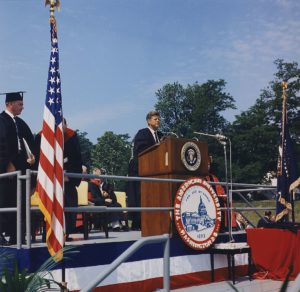Last night, we had the first presentation in our online conference “The National Security State and the Kennedy Assassination.” Our first speaker was James DiEugenio, who has been the leading figure in the JFK assassination research community highlighting how President Kennedy’s policy toward independence movements in Third World countries was contrary to the policy held by the U.S. national-security establishment, namely the Pentagon and the CIA.
After World War II, the federal government was converted from a limited-government republic to a national-security state. This was when the U.S. government, specifically the CIA, acquired the powers of assassination and regime change.
 The justification for this monumental change in America’s governmental structure, which was accomplished without a constitutional amendment, was a supposed grave threat to the United States from a supposed international communist conspiracy to take over the world that was supposedly based in Moscow, Russia.
The justification for this monumental change in America’s governmental structure, which was accomplished without a constitutional amendment, was a supposed grave threat to the United States from a supposed international communist conspiracy to take over the world that was supposedly based in Moscow, Russia.
Americans barely had time to celebrate their victory in World War II when they began to be told that they were now facing an even more dangerous enemy than Nazi Germany. That enemy was the Soviet Union (i.e., Russia), which, ironically, had been America’s partner and ally in World War II.
Public officials, from the president down to the local public school teacher, inculcated Americans with a deep fear of communism and communists. Everyone was told that the communists were coming to get us. And supposedly the Reds were everywhere. The State Department. Congress. The army. Hollywood. The public schools. Some people even claimed that President Eisenhower was a communist agent. And by 1959, they were only 90 miles away from American shores, in Cuba.
It is impossible to overstate the deep fear of communism and communists that was inculcated into the American people. This is why so few people objected when U.S. officials intervened in Korea’s and Vietnam’s civil wars. The notion was that if we don’t stop the Reds there, it won’t be long before they are on American shores.
As Jim pointed out in his talk last night, in the late 1950s and early 1960s, there were independence movements in Third World nations that were trying to cast off the shackles of colonial rule by such imperialist powers as Great Britain, France, and Belgium. Colonial rule, more often than not, had turned out to be brutal for the people living in those nations. They had had enough and were now agitating and fighting for independence.
Taking the position that these independence movements were communist-inspired, the Pentagon and the CIA sided with the colonial powers. Pentagon and CIA officials supported their efforts to brutally put down these revolts to ensure that these Third World nations remained as part of the “free world.”
While he was a U.S. Senator and before he was running for president, Kennedy took an opposite position. He came out publicly in favor of these independent movements, arguing that the United States should be siding with the rebels rather than with the imperial powers.
As Jim related in his talk, knowing that Kennedy sympathized with Congo leader Patrice Lumumba and his independence movement, the CIA decided to act fast, before Kennedy could interfere with its plans to rid the world of Lumumba through assassination. The CIA succeeded in its goal. Lumumba, who was an innocent man, was assassinated just a few days before Kennedy assumed the presidency. The CIA then waited three weeks to inform Kennedy that Lumumba was dead. As Jim pointed out, Kennedy’s anguish upon learning of Lumumba’s death through a telephone call was captured by a photographer. You can see Kennedy’s reaction to Lumumba’s death here.
Thus, in the eyes of the national-security establishment, which had already been opposing the supposed international communist threat for some 20 years, Kennedy was beginning his presidency in a very auspicious way, given his support for what the Pentagon and the CIA were certain was a grave threat to U.S. national security. As we will see as their conference proceeds, things would only go from bad to worse as Kennedy term in office proceeded.
Over the years, people have sometimes asked me what the relevance is of the JFK assassination given the long passage of time since it occurred. The relevance is this: It’s a straight line from that assassination to what we are living under today — a system of state-sponsored assassinations, including against American citizens, anti-democratic coups, installation of dictatorial regimes, alliances with dictatorial regimes, support of dictatorial regimes, wars of aggression, perpetual wars, the war on terrorism (and Muslims and communists), fear of Russia, fear of China, denial of due process, torture, indefinite detention, prosecution of people who reveal the dark-side secrets of the deep state, and much more. Understanding the who and the why of the Kennedy assassination enables one to gain a deeper understanding of the way of life we live under today — and what we need to do to extricate ourselves and our nation from this deadly, destructive, and immoral morass.
The Q&A after Jim’s talk was lively. We started the evening at 7 p.m. Eastern Time. When we finally wrapped up, it was 9:30 pm. And there were still lots of questions from the audience pending.
We recorded the talk and it will be on our website shortly. If you missed it, I recommend watching it before the next talk by Mike Swanson about the origins of the war state and the Vietnam War. Mike’s talk will be Wednesday, March 10. at 7 pm Eastern. Register at our conference website. Registration is free.



